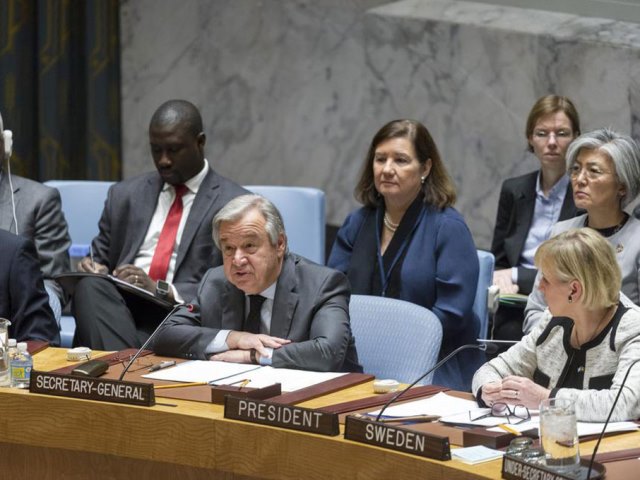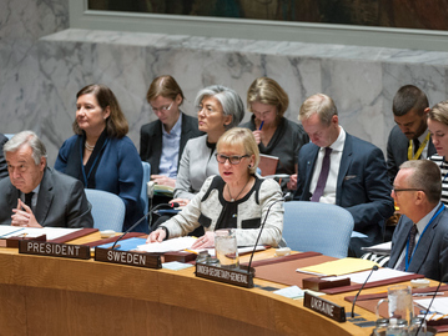UN Secretary-General António Guterres stressed in his policy speech in January 2017 to the Security Council that primary duty lies with member states for preventing conflict and sustaining peace.

Secretary-General António Guterres noed in his first address to the meeting of the Security Council of the United Nations in January 2017 called by Sweden and chaired by Margot Wallström, Sweden’s Minister for Foreign Affairs and Council President for January, who asked: “Can we afford an ever-growing list of crises slipping into violent conflict and needless human misery?” According to the press release issued by the UN Department of Public Information, the Swedish Foreign noted that investing in prevention was not only morally right, but also the smart, economically sound and sustainable thing to do, she emphasized.
Secretary-General António Guterres noted that the international focus had for decades been largely on responding to conflict,and emphasized that more must be done to prevent war and sustain peace. “People are paying too high a price,” he said. “You, the Member States, are paying too high a price. We need a whole new approach.”
Opening the day-long high-level debate on conflict prevention and sustaining peace, António Guterres emphasized that it had proven “very difficult” to persuade decision makers to make prevention their priority, although the rule-based international order under which the United Nations had been established was under grave threat. “We must rebalance our approach to peace and security,” he stressed.

Margot Wallström, Sweden’s Minister for Foreign Affairs and Council President for January, asked: “Can we afford an ever-growing list of crises slipping into violent conflict and needless human misery?” Investing in prevention was not only morally right, but also the smart, economically sound and sustainable thing to do, she emphasized. The international community had sufficient tools but needed a new political consensus in support of prevention, she added.
The United Kingdom’s Minister of State for Europe and the Americas echoed that sentiment, pointing out that the United Nations response to global challenges had evolved significantly over the last seven decades. The challenge now was how to use modern tools more effectively. Similarly, Ethiopia’s Minister for Foreign Affairs emphasized that prioritizing conflict prevention was not really an option, but a necessity.
Japan’s State Minister for Foreign Affairs emphasized that effectively sustaining peace would require reform of the United Nations. That would involve taking down institutional silos while reinforcing coordination in order to create a seamless and holistic approach to sustaining peace. On that point, Italy’s Minister for Foreign Affairs suggested that reform could entail revising the Secretariat’s structure and a new distribution of roles and responsibilities.
Several speakers welcomed the Council’s comprehensive peace reviews, saying they provided clear support for a conceptual change, including the abandonment of conflict management in favor of prevention and tackling the root efforts of conflict. While agreeing broadly, Kazakhstan’s Minister for Foreign Affairs emphasized the need to develop a systemic approach to identifying and preventing emerging crises. Indeed, the Council should have direct oversight of peacebuilding, including through greater cooperation with the Secretary-General, who should play a crucial role as an “honest broker” and “bridge-builder” at the earliest stages of conflict prevention, he said.
A number of delegates raised the question of cooperation, with Bolivia’s delegate emphasizing the need to establish dynamic alliances while ensuring that regional efforts received sufficient attention. Rwanda’s representative said that experience in conflict prevention had shown that the African Union was better positioned in terms of knowledge, proximity and the ability to mobilize and respond quickly.
Also speaking today were representatives of the United States, France, Ukraine, Uruguay, China, Russian Federation, Egypt, Senegal, Poland, Latvia, Netherlands, Rwanda, Republic of Korea, Thailand, Finland, Germany, Brazil, Colombia, South Africa, Norway, Pakistan, Iraq, Hungary, Lebanon, Ecuador, Argentina, Australia, Canada, Viet Nam, Chile, Switzerland, Iran, Estonia, Indonesia, Cuba, Bangladesh, Peru, Ireland, Federated States of Micronesia, Jordan, Papua New Guinea, Sudan, Azerbaijan, Turkey, Nigeria, Belgium, Georgia, Panama, India, Kuwait, Venezuela, Mexico, Austria, Republic of Moldova, United Arab Emirates, Sri Lanka, Portugal, Syria, Slovenia, Guatemala, Morocco, Israel, Denmark, Philippines, Mali, Bulgaria, Djibouti, Sierra Leone, Malaysia, Namibia, Equatorial Guinea, Armenia, Afghanistan, Belarus, Cambodia, Kenya, Haiti, Slovakia, Cyprus, Marshall Islands, Liechtenstein and the Democratic People’s Republic of Korea.
Meeting Coverage and Press Releases
ANTÓNIO GUTERRES, Secretary-General of the United Nations, said that the Organization had been established to prevent war by binding the international community in a rules-based international order. “Today, that order is under grave threat,” he stressed, noting that millions of people in crisis looked to the Security Council to preserve global stability and to protect them from harm. However, the enormous human and economic cost of conflicts around the world showed how complex and challenging that was. It was unfortunate that the international community spent far more time and resources responding to crises rather than preventing them. “People are paying too high a price. You, the Member States, are paying too high a price. We need a whole new approach,” he underscored.
It had proven very difficult to persuade decision-makers at both the national and international levels to make prevention their priority, he continued, noting that it was, perhaps, because successful prevention did not attract attention. Most of today’s conflicts were still essentially internal, even if they quickly took on regional and transnational overtones. They were fuelled by competition for power and resources, inequality, marginalization and exclusion, poor governance, weak institutions and sectarian divides. Furthermore, they were exacerbated by climate change, population growth and the globalization of crime and terrorism. With so many factors at work, it took very little to trigger a crisis that could engulf a country or a region, with global consequences.
While the causes of crisis were deeply interlinked, the United Nations response remained fragmented, he said. The interconnected nature of today’s crises required the international community to connect global efforts for peace and security, sustainable development and human rights, not just in words, but in practice. The 2030 Agenda for Sustainable Development and the General Assembly and Security Council resolutions on sustaining peace demonstrated strong intergovernmental support for an integrated approach. The challenge now was to make corresponding changes to our culture, strategy, structures and operations.
“We must rebalance our approach to peace and security,” he said. For decades, the focus had been largely on responding to conflict. In the future, the international community must do far more to prevent war and sustain peace, he said, stressing that the reforms he was setting in motion aimed to achieve that. “I have started with the decision-making processes in the Secretariat,” he said, noting that the newly established Executive Committee would increase the ability to integrate all pillars of the United Nations under a common vision for action.
Also, he said he had appointed a Special Adviser on Policy, whose main task would be to map the prevention capacities of the United Nations system and to bring them together into an integrated platform for early detection and action. That would enable the Organization to link the reform of the peace and security architecture with the reform of the United Nations development system, while respecting the competence of the Security Council and the General Assembly.
“The primary work of conflict prevention lies with Member States,” he continued, stressing that the entire United Nations system must be ready to help Governments implement the Sustainable Development Goals. As societies became multi-ethnic, multi-religious and multicultural, the international community needed greater political, cultural and economic investments in inclusivity and cohesion, so that people could appreciate the benefits of diversity rather than perceiving it as a threat. All groups needed to see that their individual identities were respected, while feeling that they belonged as valued members of the community as a whole. Civil society, to that end, had a role to play in raising the alarm when that respect was threatened or lost.
He went on to emphasize the need for a surge in diplomacy, in partnership with regional organizations. “We will launch an initiative to enhance our mediation capacity, both at United Nations Headquarters and in the field, and to support regional and national mediation efforts,” he said, expressing readiness to support the Security Council through the use of his good offices and his personal engagement.
“Too many prevention opportunities have been lost because Member States mistrusted each other’s motives, and because of concerns over national sovereignty,” he said, stressing that such concerns were understandable, in a world where power was unequal and principles had sometimes been applied selectively. Prevention should never be used to serve other political goals. On the contrary, prevention was best served by strong sovereign States, acting for the good of their people. “In taking preventive action, we need to avoid double standards,” he underlined, adding that preventive action was essential to avert mass atrocities or grave abuses of human rights.
International cooperation for prevention, and particularly translating early warning into early action, depended on trust between Member States, and in their relations with the United Nations, he said. He stood ready to foster a more trusting relationship and to improve communications with the Council, with consistency, candour and transparency. Disagreements about the past could not be allowed to prevent the international community from acting today. On the contrary, the international community needed to demonstrate leadership, and strengthen the credibility and authority of the United Nations, by putting peace first. “Ending the boundless human suffering and the wanton waste of resources generated by conflict is in everyone’s interests,” he underscored.
“War is never inevitable. It is always a matter of choice: the choice to exclude, to discriminate, to marginalize, to resort to violence,” he said, noting that, by restoring trust between Governments and their citizens and amongst Member States, the international community could prevent and avoid conflict. However, peace, too, was never inevitable. It was the result of difficult decisions, hard work and compromise. “If we live up to our responsibilities, we will save lives, reduce suffering and give hope to millions,” he concluded.
